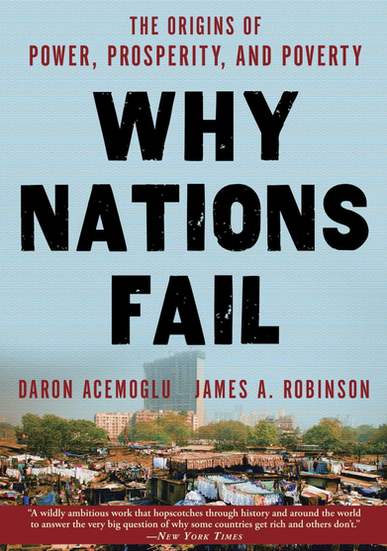歐洲定格:沉淪威尼斯─從經濟強權淪為博物館
- glosnapgs
- 2024年4月25日
- 讀畢需時 4 分鐘
已更新:2024年4月27日
在公元八世紀,威尼斯共和國從君士坦丁堡政權獲得自治權,直至十五世紀末,即新航線開闢、歐洲的商業中心從地中海轉移至大西洋前,威尼斯共和國是中世紀和文藝復興時期,歐洲領先經濟及貿易強國。隨著法國拿破崙佔領威尼斯,共和國才宣告滅亡,其後納入意大利版圖。
作為意大利最成功海上共和國,威尼斯的興盛歸功於康曼達經濟模式。這是單次貿易組成的合股公司,由定居者及旅行者合夥人組成,負責投資及售貨。若合由定居者百分百投資,定居者最終獲利四分三;若雙方出資,定居方出資六成七、獲利五成,因此製造不少上流機會。
廣納式經濟促使政治體制變得開放。負責管理威尼斯的總督由公民大會選出,終身任職。公民大會由核心家族主導,一零三二年,總督改由新創立的總督委員會遴選,確保總督不會擁有絕對權力。一零八二年,威尼斯在君士坦丁堡取得貿易優惠,正式建立威尼斯區。
總督在一一七一年被謀殺後,威尼斯設立由貴族主導的大會議,成員除由公職人員組成,另從大會議抽籤四人組成委員會,提名一百個大會議成員。大會議亦會遴選兩個次級會議:參議會及四十人會議成員;並要求總督宣誓服從法官,所有決定均須由總督委員會批准。
十年河東,十年河西。一二八六年的政治鬥爭與修憲成為威尼斯封閉的開端:若被提名者父親或祖父曾擔大會議成員,便可以自動確認當選,否則須獲總督委員會確認;另外,大會議又通過多一項修項,要求大會議的成員人選,必須經由四十人會議、總督和總督委員會的批准。
一二九七年,政治制度進一步收緊,若曾在過去四年擔任大會議成員的人士,便會自動獲得提名和批准;新提名人選則須獲四十人會議批准。大會議已由世襲貴族壟斷,他們甚至禁止康曼達契約,向商人徵收重稅;及建立船隊從事貿易,實施貿易國有化,排除個別商人獲益。
在《國家為什麼會失敗》中,作者形容威尼斯窮得只剩下漁業及旅遊業,從開創廣納式制度的經貿強權,改為向遊客製作薄餅及彩繪玻璃。遊客前往感受封閉前的威尼斯,猶如走進博物館,在威尼斯大運河乘坐貢多拉,在聖馬可大教堂欣賞從拜占庭劫掠而來的銅馬緬懷過去。
名稱:國家為什麼會失敗:權力、富裕與貧困的根源 (Why Nations Fail: The Origins of Power, Prosperity, and Poverty)
作者:Daron Acemoglu、James A. Robinson
年份:2012
出版地:美國
出版社:Crown Business
類別:比較政治、經濟學
評分:8/10
The Sinking Venice - from Economic Powerhouse to Museum
Venice is the northeastern city in Italy and the capital of the Veneto region. Back in the 8th century, the city gained its autonomy from the Byzantines. By the end of the 15th century, when the European commercial center shifted from the Mediterranean to the Atlantic, it was once a major financial and maritime power during the Middle Ages and Renaissance.
Growing as a powerful commercial kingdom, Venice won’t succeed without the commenda. As a rudimentary type of joint stock company, it formed only for a single trading. The sedentary partner invested capital, while the traveling one accompanied the cargo. Each party shared a proportional profits based on their investment, which fostered upward social mobility.
An inclusive economic institution gave rise to a more open system. The doge, who governed Venice, was selected for life by the General Assembly. The assembly was dominated by a group of powerful families. In 1032, the doge was elected by a newly created Ducal Council, whose job was to ensure that he did not acquire absolute power. In 1082, Venice was granted extensive trade privileges in Constantinople.
Following the murder of the doge in 1171, Venice was forced to establish the Great Council, which was made up of officeholders and dominated by aristocrats. 4 council members would nominate 100 new members to the assembly. The council chose members for 2 sub-councils, the Senate and the Council of Forty, for some legislative and executive tasks. New doge had to swear an oath in order to circumscribe ducal power.
The Constitution amendment of 1286 foreshadowed La Serrata, aka “The Closure" of Venice. An automatic confirmation would be granted if one’s fathers and grandfathers had served on the council. Otherwise, it required the confirmation of the Ducal Council. Also, the appointment of the Great Council must be approved by the Council of Forty, the doge, and the Ducal Council.
In the following years, if one had been a member of the Great Council in the previous 4 years, one would receive the automatic nomination. New nominations had to be approved by the Council of Forty. The Council thus adopted an economic Serrata, by the prohibition of commenda contracts, and the collection of high taxation. Long-distance trade became the preserve of the nobility, marking the end of Venetian prosperity.
In “Why Nations Fail” the author describes the only economy Venice has is fishing and tourism. Instead of pioneering trade routes and economic institutions, Venetians make pizza and blow colored glass for visitors. It is as if a museum, allowing the tourists to take the Gondola in the Lagoon, and to praise the lions of the St. Mark's Cathedral, which were looted from Byzantium.
Title: Why Nations Fail: The Origins of Power, Prosperity, and Poverty
Author: Daron Acemoglu, James A. Robinson
Year: 2012
Region: USA
Publisher: Crown Business
Genre: Comparative Politics, Economics
Score: 8/10








留言